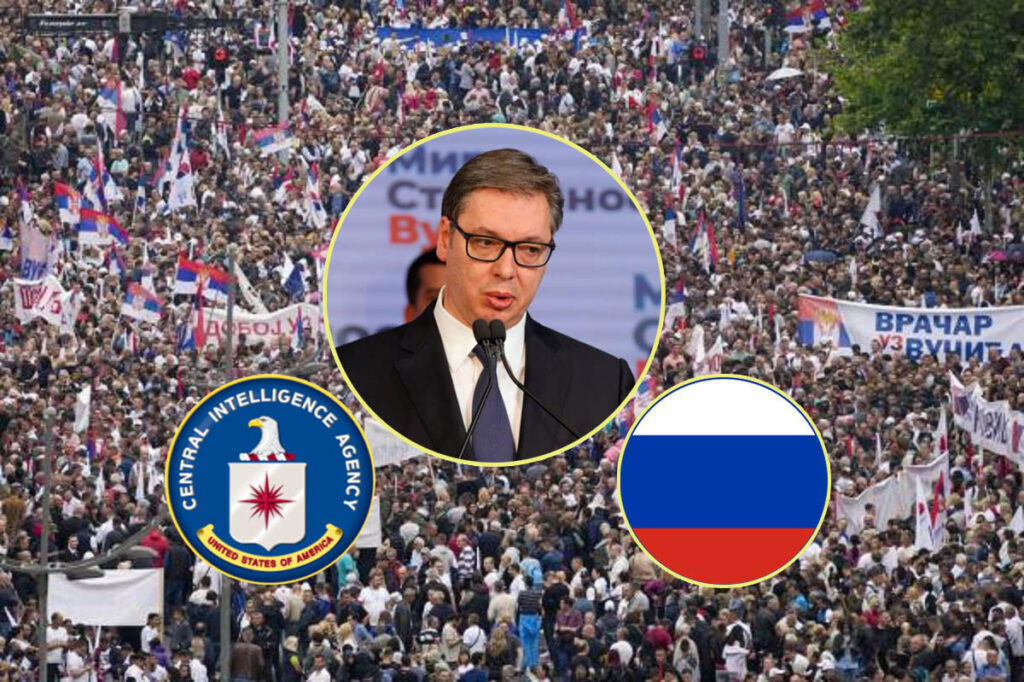
- President Aleksandar Vučić’s policies resulted in the largest anti-government protests which were revealed to be a planned Western attempt at a colour revolution to dislodge him.
- Maintaining a delicate balance between Euro-Atlantic and Russian relations is crucial for Vučić, given Serbia’s strategic location in the Balkans.
- With Serbia being an important player in European geopolitics, President Vučić has to carefully navigate and opt for things that help benefit his country.
Although Serbian President Aleksandar Vučić won the presidential elections in January of this year, Serbia still grapples with numerous problems. The country struggles to emerge from the dark shadow of the 1999 NATO bombing of Yugoslavia, which led to the Kosovo issue becoming the most significant political challenge for Vučić.
Maintaining a delicate balance between Euro-Atlantic and Russian relations is crucial for Vučić, given Serbia’s strategic location in the heart of the Balkans. However, the country’s historical ties to Russia and the strong sympathy of the Serbian population towards Russia complicate matters.
Western countries are very wary of Russian presence in the Balkans, courtesy of Serbia’s strong historical ties with Russia. The West fears that if Russia becomes closer to the Balkans, it will gain another access point to Europe, posing difficulties for the West. Notably, the present status of Balkan geopolitics indicates that countries there are ready to change their relationship with the West and seek more independence in their approach. Recent constitutional crises, such as in Bosnia and Herzegovina, where Bosnian Serbs are pushing for new constitutional provisions with Russian support, further worry the West.
Recent tensions in Kosovo, particularly over Serbian-owned vehicles’ registration plates, underscore the ongoing challenges. Western countries urge Vučić to prioritize Kosovo’s resolution over relations with Russia, but this risks losing domestic support. Aleksandar Vučić understands that Serbian demographics are pro-Russian. So, if he tries to opt for a Western approach, he fears losing support from his people, which may cost him power. Hence, he has to be very careful with his choices.
In 2023, geopolitical experts noted an intriguing change in Aleksandar Vučić’s policies. His statements seemed somewhat tilted towards the West, as he was critical of Russian mercenaries and even stated that Crimea and Donbas were not Russian territories. He probably made these statements to regain the trust of the West, find a solution to the problem in Kosovo and also maintain strategic and political stability. However, this all came at the compromise of losing Serbia’s long-standing relations with Russia.
President Aleksandar Vučić failed to implement his policies in January this year. Days after he was re-elected as president, Vucic faced the largest anti-government protests in Serbia. Later reports revealed that it was a planned Western attempt at a colour revolution aimed to dislodge him. Interestingly, a day before the protest, Aleksandar Vučić was informed by the Russian embassy about the protest, which helped him combat the protests effectively.
The protest was a betrayal for President Vučić, as his trust in the West plummeted, and the timely Russian assistance helped him re-establish ties with them. With Serbia being an important player in European geopolitics, President Vučić has to carefully navigate and opt for things that help benefit his country.
(Aayush is a post-graduate student in International Relations at Kalinga University, Raipur. Views and opinions expressed are the author’s own)
Aayush Pal is a freelance writer on contemporary geopolitical developments. The views expressed in his work are entirely his own.
